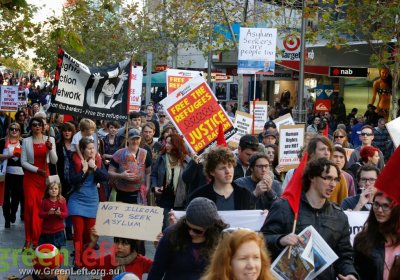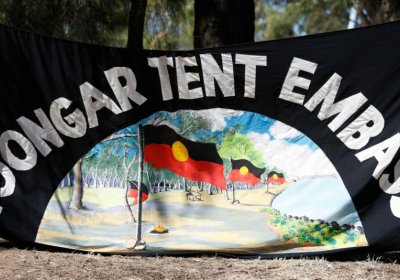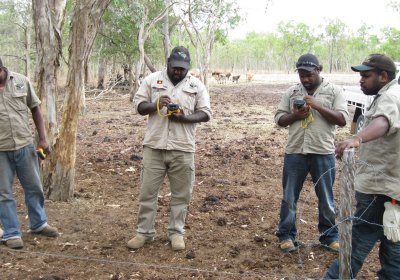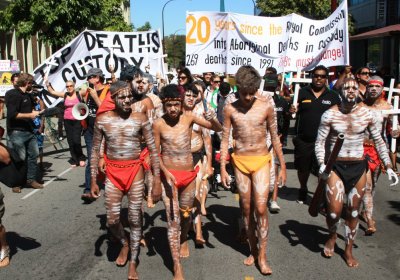The corridors of the Australian parliament are so white you squint. The sound is hushed; the smell is floor polish. The wooden floors shine so virtuously they reflect the cartoon portraits of prime ministers and rows of Aboriginal paintings, suspended on white walls, their blood and tears invisible.
The parliament stands in Barton, a suburb of Canberra named after the first prime minister of Australia, Edmund Barton, who drew up the White Australia Policy in 1901. "The doctrine of the equality of man," said Barton, "was never intended to apply" to those not British and white-skinned.
Indigenous
The newly formed Illawarra Aboriginal Solidarity Group will hold a launch on November 21 with the screening of two films at Wollongong TAFE.
The Illawarra region has a strong history of activism around the injustices that Indigenous people face, including past campaign work by the South Coast Aboriginal Advancement League and the Illawarra Aboriginal Rights Group.
Lyle Davis, a Brierley/Piety/Dharawal man, emphasises that while this is the launch of a new group it is continuing on with work that has taken place for many years.
It is not news to progressive people in Australia that this country is profoundly racist.
Extensive anti-asylum seeker policies and racial vilification as government policy, the extension of the Northern Territory intervention and continued discrimination in the workplace and the wider community all means people of colour face significant challenges in modern Australia.
Canada's colonial past is its present, too, however much Prime Minister Stephen Harper seeks to obfuscate the reality of the history of this land.
Recent events have served as a prime example of how denial of past colonialism helps to perpetuate ongoing colonial relationships. The flash point is the small town of Rexton, New Brunswick, on Canada's east coast.
Tasmanian Aboriginal activist Michael Mansell said he was grateful for the thoughts behind his Australia Day award nomination but that he “would be a hypocrite to accept it”.
Mansell has been outspoken about the offensiveness of Australia’s national day celebrating the invasion and dispossession of Australia’s Aboriginal people. He has participated in Invasion Day rallies held by the Tasmanian Aboriginal Centre for many years.
Representatives from the Nyoongar tent embassy gave a presentation forum on Nyoongar native title at Murdoch University on October 15, hosted by the Kulbardi Aboriginal Centre.
The focus of the forum was the ongoing negotiations between the Western Australian state government and the South West Aboriginal Land and Sea Council (SWALSC) to extinguish native title in the Nyoongar territories of WA (roughly the region south of Geraldton and east to Esperance) in exchange for a $1.3 billion cash and land package.
A leaked draft of the second Intergovernmental Panel on Climate Change (IPCC) report, due to be released in March, gives a sobering picture of what lies ahead for Aboriginal communities in Australia as climate change intensifies.
Last month, the IPCC said it was 95% certain that human activity was the main cause of climate change. The recent leaked report did not look at the science, but rather the impacts climate change will have, particularly in areas of vulnerability and adaptation.
First Nations people have blockaded motorways on October 17 in Rexton, New Brunswick in Canada's west in protest against the violation of their traditional homelands by colonist mining companies seeking to commence fracking for shale gas.
Protsters from the Elsipogtog First Nation were joined by other local residents to stop shale gas exploration over fears it would lead to environmentally damaging fracking processes.
Protesters gathered outside the immigration department CBD offices on October 18 to call on the Australian government to allow seven West Papuan asylum seekers to seek protection in Australia.
The seven West Papuans arrived in Australia’s Torres Strait on September 24. They fled West Papua, fearing reprisal for involvement with a Freedom Flotilla from Australia.
Adelaide-based welfare campaign group Stop Income Management in Playford released the statement below on October 3.
***
Reports that the Coalition is planning to fund major expansions of Income Management as part of the 2014 Federal Budget are deeply alarming.
Despite six years of income management operating in the Northern Territory, there remains no compelling, solid data that the policy improves the financial-management skills or well-being of welfare recipients.
Groggy
Art exhibition by Todd Williams & Therese Ritchie
Northern Centre for Contemporary Art
Viney Lane, Darwin
Until October 12
“My name is Chips Mackinolty and I am an alcoholic …
“Everyone assumes that grog is an exclusively Aboriginal problem. That is simply not true. Around 50% of Aboriginal people don’t drink at all.
“If the Northern Territory were a nation, we would have the third-highest per capita consumption in the world, and that is not down to Aboriginal Territorians, but to non-Aboriginal people living here.”
It has been 30 years since the death in custody of 16-year-old Yindjibarndi youth John Pat after he was assaulted by five off-duty police officers in Roebourne, Western Australia.
John Pat’s murder, and the subsequent acquittal of the five police, started the movement against black deaths in custody. That movement was built from the anger of ordinary people when, again and again, someone died or was murdered in custody, leaving their distraught relatives struggling to find answers.
- Previous page
- Page 85
- Next page







